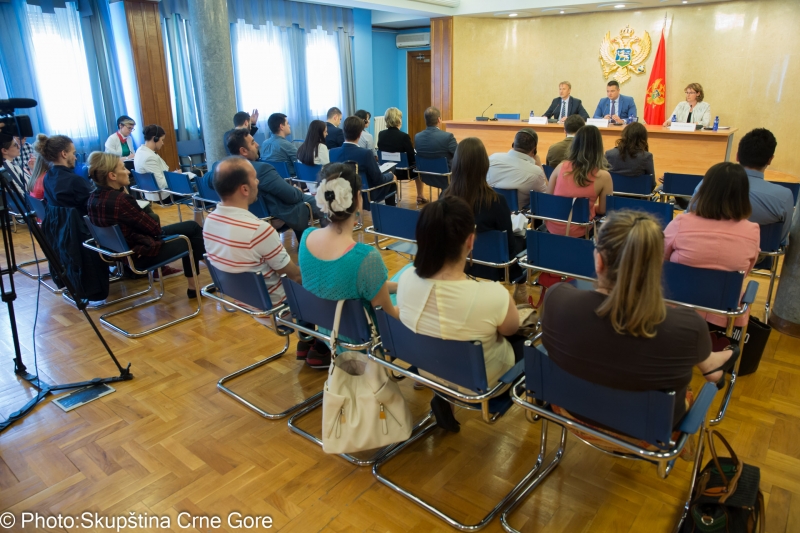Committee on European Integration today has organised a public debate titled “Montenegro and the EU: negotiations in the field of economic and monetary policy”. The following spoke at the debate: Mr Adrijan Vuksanović, Chairperson of the Committee on European Integration, H.E. Aivo Orav, Head of the EU Delegation to Montenegro, and Ms Milica Kilibarda, Head of the Working Group for preparing negotiations in Chapter 17 – Economic and monetary union.
In his introductory speech, Chairperson of the Committee Mr Adrijan Vuksanović said that Chapter 17 covered issues relating to the functioning of the European Monetary Union (usage of the euro currency, cooperation with the European Central Bank in the framework of the European System of Central Banks, the Maastricht criteria relating to inflation, budget deficit and public debt), as well as issues of stability of public finances and overall macroeconomic stability. He expressed satisfaction with the fact that first debate of this kind in the 26th convocation of the Parliament is organised on such important topic as economic and monetary policy.
Head of the EU Delegation to Montenegro Mr Aivo Orav said that high quality economic governance was a major precondition for ensuring the country's sound economic development, and that it would prepare Montenegro for future participation in the European semester, a new framework for coordinating economic policies across the Union. He especially emphasised the fact that Montenegro should find new ways to boost the competitiveness of its economy, and diversify sources of growth, and he also pointed out the strengthening of the rule of law, reducing the informal sector, and tackling corruption as key preconditions to improve business climate.
Head of the Working Group for preparing negotiations in Chapter 17 Ms Milica Kilibarda spoke of two key aspects of this chapter, monetary and economic policy, as well as reforms that Montenegro must implement in order to be ready to assume obligations of the EU membership. She especially pointed out the amendments to the current Law on Central Bank of Montenegro and the Constitution of Montenegro in order to ensure independence of the Central Bank, as well as amendments to the current and adoption of new laws relating to prohibition of privileged access of the public sector to financial institutions. Progress was achieved in the part of strengthening of administrative capacities in this field, and that would be one of the important segments of reforms in the future period as well.
Participants in the public debate were interested to know how the issue of using the Euro in Montenegro would be regulated in negotiations, what tasks should we complete in order to become a member of the Eurozone, what were the capacities of the Central Bank of Montenegro in this area, as well as what were the key challenges in preparation for the membership in the Union.
It was noted that the recent fulfilment of the two opening benchmarks provided the possibility to open negotiations on the Chapter 17 by the end of 2017, by which Montenegro would go a step further in the process of aligning with the EU legislation, with a view to its future integration into the EU financial and economic system.












